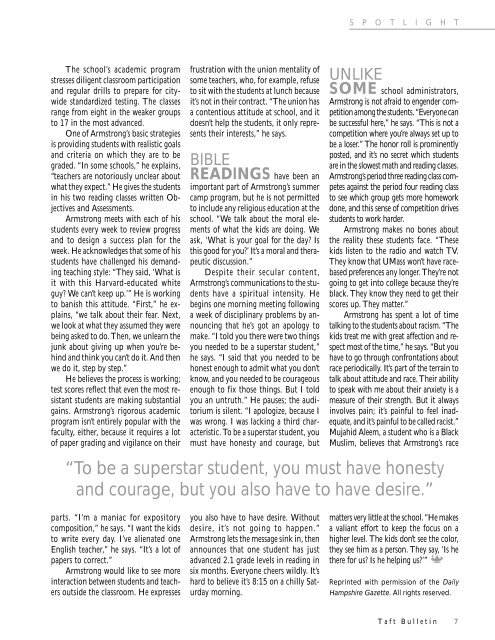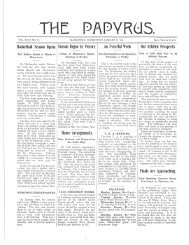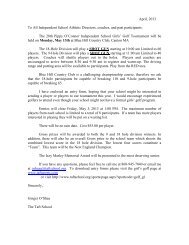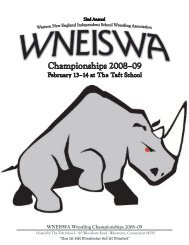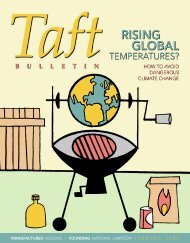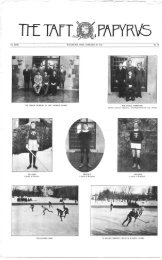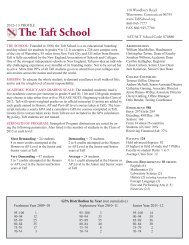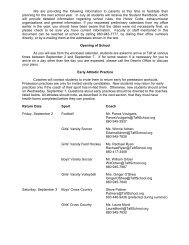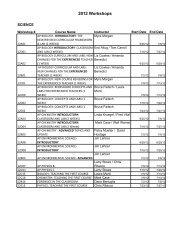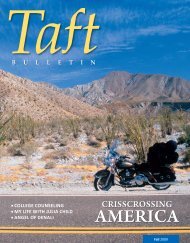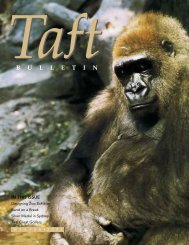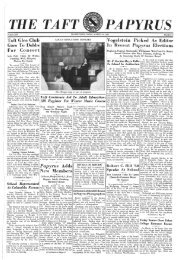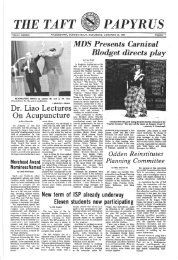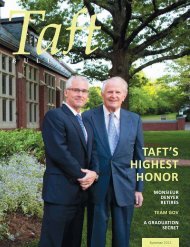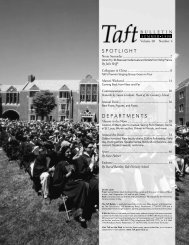By Lauren Henry '99 - The Taft School
By Lauren Henry '99 - The Taft School
By Lauren Henry '99 - The Taft School
- No tags were found...
You also want an ePaper? Increase the reach of your titles
YUMPU automatically turns print PDFs into web optimized ePapers that Google loves.
S P O T L I G H T<strong>The</strong> school’s academic programstresses diligent classroom participationand regular drills to prepare for citywidestandardized testing. <strong>The</strong> classesrange from eight in the weaker groupsto 17 in the most advanced.One of Armstrong’s basic strategiesis providing students with realistic goalsand criteria on which they are to begraded. “In some schools,” he explains,“teachers are notoriously unclear aboutwhat they expect.” He gives the studentsin his two reading classes written Objectivesand Assessments.Armstrong meets with each of hisstudents every week to review progressand to design a success plan for theweek. He acknowledges that some of hisstudents have challenged his demandingteaching style: “<strong>The</strong>y said, ‘What isit with this Harvard-educated whiteguy? We can’t keep up.’” He is workingto banish this attitude. “First,” he explains,“we talk about their fear. Next,we look at what they assumed they werebeing asked to do. <strong>The</strong>n, we unlearn thejunk about giving up when you’re behindand think you can’t do it. And thenwe do it, step by step.”He believes the process is working;test scores reflect that even the most resistantstudents are making substantialgains. Armstrong’s rigorous academicprogram isn’t entirely popular with thefaculty, either, because it requires a lotof paper grading and vigilance on theirfrustration with the union mentality ofsome teachers, who, for example, refuseto sit with the students at lunch becauseit’s not in their contract. “<strong>The</strong> union hasa contentious attitude at school, and itdoesn’t help the students, it only representstheir interests,” he says.BIBLEREADINGS have been animportant part of Armstrong’s summercamp program, but he is not permittedto include any religious education at theschool. “We talk about the moral elementsof what the kids are doing. Weask, ‘What is your goal for the day? Isthis good for you?’ It’s a moral and therapeuticdiscussion.”Despite their secular content,Armstrong’s communications to the studentshave a spiritual intensity. Hebegins one morning meeting followinga week of disciplinary problems by announcingthat he’s got an apology tomake. “I told you there were two thingsyou needed to be a superstar student,”he says. “I said that you needed to behonest enough to admit what you don’tknow, and you needed to be courageousenough to fix those things. But I toldyou an untruth.” He pauses; the auditoriumis silent. “I apologize, because Iwas wrong. I was lacking a third characteristic.To be a superstar student, youmust have honesty and courage, butUNLIKESOME school administrators,Armstrong is not afraid to engender competitionamong the students. “Everyone canbe successful here,” he says. “This is not acompetition where you’re always set up tobe a loser.” <strong>The</strong> honor roll is prominentlyposted, and it’s no secret which studentsare in the slowest math and reading classes.Armstrong’s period three reading class competesagainst the period four reading classto see which group gets more homeworkdone, and this sense of competition drivesstudents to work harder.Armstrong makes no bones aboutthe reality these students face. “<strong>The</strong>sekids listen to the radio and watch TV.<strong>The</strong>y know that UMass won’t have racebasedpreferences any longer. <strong>The</strong>y’re notgoing to get into college because they’reblack. <strong>The</strong>y know they need to get theirscores up. <strong>The</strong>y matter.”Armstrong has spent a lot of timetalking to the students about racism. “<strong>The</strong>kids treat me with great affection and respectmost of the time,” he says. “But youhave to go through confrontations aboutrace periodically. It’s part of the terrain totalk about attitude and race. <strong>The</strong>ir abilityto speak with me about their anxiety is ameasure of their strength. But it alwaysinvolves pain; it’s painful to feel inadequate,and it’s painful to be called racist.”Mujahid Aleem, a student who is a BlackMuslim, believes that Armstrong’s race“To be a superstar student, you must have honestyand courage, but you also have to have desire.”parts. “I’m a maniac for expositorycomposition,” he says. “I want the kidsto write every day. I’ve alienated oneEnglish teacher,” he says. “It’s a lot ofpapers to correct.”Armstrong would like to see moreinteraction between students and teachersoutside the classroom. He expressesyou also have to have desire. Withoutdesire, it’s not going to happen.”Armstrong lets the message sink in, thenannounces that one student has justadvanced 2.1 grade levels in reading insix months. Everyone cheers wildly. It’shard to believe it’s 8:15 on a chilly Saturdaymorning.matters very little at the school. “He makesa valiant effort to keep the focus on ahigher level. <strong>The</strong> kids don’t see the color,they see him as a person. <strong>The</strong>y say, ‘Is hethere for us? Is he helping us?’”Reprinted with permission of the DailyHampshire Gazette. All rights reserved.<strong>Taft</strong> Bulletin 7


